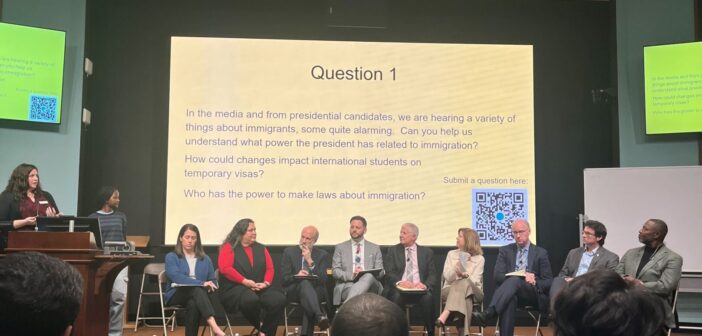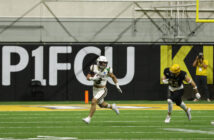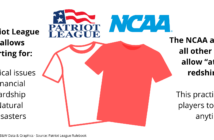In an effort to increase engagement of international students in the upcoming election, despite their ineligibility to vote, the Office of International Students and Scholars hosted its first ever International Student Town Hall yesterday in Whitaker Lab.
The panelists at the event — Katherine Lavinder, interim vice president for student affairs; Carolina Hernandez, assistant dean and director of the Community Service Office; Andrew Fuller, an immigration attorney in Philadelphia; Brian Fife, professor and chair of the Political Science Department; Donald Outing, vice president for equity and community; Frank Roth, ‘80, General Counsel Of Lehigh; Nathan Urban, provost and senior vice president for academic affairs; Cheryl Matherly, vice president and vice provost for international affairs and Jason Schiffer, associate vice president of campus safety and chief of police — discussed the influence American politics has on international students and the role they have in democracy.
Amanda Connolly, the director of the Office of International Students and Scholars, said the International Student Advisory Board was created this year, composed of 16 students from 15 different countries.
“It became apparent in our second meeting that international students have a lot of questions regarding how the election process works and affects them,” Connolly said.
She said some international students wondered how they fit into the election process, so the board decided to allow them to learn how to be more involved.
Eileen Kandie, ‘27, is from Kenya and is a member of the International Student Advisory Board. She said she believes international students should become more involved in the election.
“You know how immigration policies can be changed depending on who is president,” Kandie said. “I think that was part of the main reason why we are holding this meeting because we don’t know how it might affect us.”
She said having more information about the election process may empower international students to have conversations with locals who have the power to vote.
Fuller was also in attendance and addressed audience questions surrounding immigration and said international students shouldn’t be scared by rhetoric portrayed in the media.
He said Congress hasn’t made any big changes since 1950, and the U.S. is working on the bones of an outdated system.
“Most immigration changes come through the executive branch,” Fuller said. “Know that if there is a sweeping change, there would be an authority to challenge that.”
Lavinder addressed concerns surrounding potential implications of participating in political demonstrations as an international student. She said it’s important to engage in open dialogue while ensuring that differing perspectives are shared in a way that is both safe and respectful.
She also said while university policies support having diverse viewpoints, demonstrations can’t interfere with operational activities.
Fuller said he advises students to carefully consider whether demonstrations are lawful, and he acknowledges that legal consequences can be more severe for international students than for domestic students.
“As an immigration attorney, my job is to think about all the things that can go wrong,” he said. “I want you to put those glasses on and think about whether the demonstrations are consistent with university policies.”
Implemented by the Office of Student Center Operations last year, Lavinder said the Demonstration Response Team aims to prevent the escalation of demonstrations on campus.
Hernandez said there are other ways students can make a difference beyond voting.
She said students should encourage their peers to vote, involve themselves with partisan and nonpartisan organizations, and even serve as poll observers for the election.
Zelalem Ayalew, ‘26, is from Ethiopia and said he felt more informed about the election process after attending the event.
“Sometimes you hear a bunch of stuff, but you don’t know whether it is right or wrong, even if it is from your friends,” Ayalew said. “Hearing the panelists’ great answers helps me understand what’s happening better.”






Comment policy
Comments posted to The Brown and White website are reviewed by a moderator before being approved. Incendiary speech or harassing language, including comments targeted at individuals, may be deemed unacceptable and not published. Spam and other soliciting will also be declined.
The Brown and White also reserves the right to not publish entirely anonymous comments.